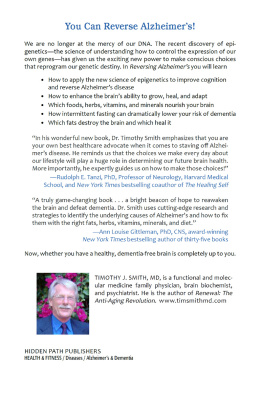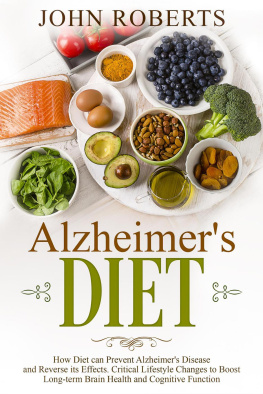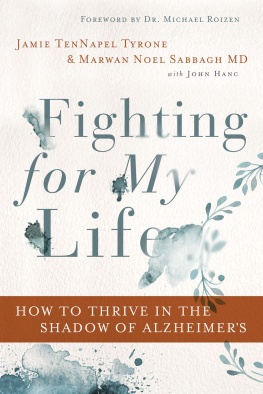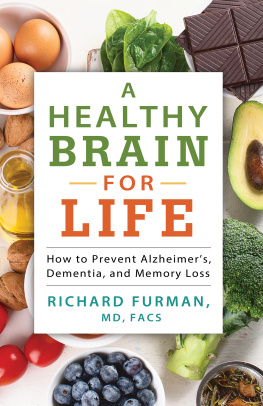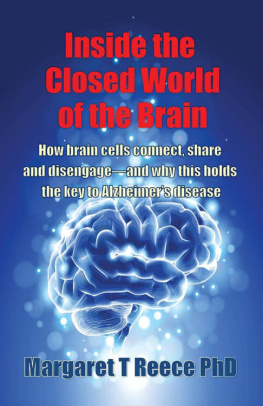Jauhar - My Fathers Brain: Life in the Shadow of Alzheimers
Here you can read online Jauhar - My Fathers Brain: Life in the Shadow of Alzheimers full text of the book (entire story) in english for free. Download pdf and epub, get meaning, cover and reviews about this ebook. year: 2023, publisher: Farrar, Straus and Giroux, genre: Non-fiction. Description of the work, (preface) as well as reviews are available. Best literature library LitArk.com created for fans of good reading and offers a wide selection of genres:
Romance novel
Science fiction
Adventure
Detective
Science
History
Home and family
Prose
Art
Politics
Computer
Non-fiction
Religion
Business
Children
Humor
Choose a favorite category and find really read worthwhile books. Enjoy immersion in the world of imagination, feel the emotions of the characters or learn something new for yourself, make an fascinating discovery.

- Book:My Fathers Brain: Life in the Shadow of Alzheimers
- Author:
- Publisher:Farrar, Straus and Giroux
- Genre:
- Year:2023
- Rating:5 / 5
- Favourites:Add to favourites
- Your mark:
- 100
- 1
- 2
- 3
- 4
- 5
My Fathers Brain: Life in the Shadow of Alzheimers: summary, description and annotation
We offer to read an annotation, description, summary or preface (depends on what the author of the book "My Fathers Brain: Life in the Shadow of Alzheimers" wrote himself). If you haven't found the necessary information about the book — write in the comments, we will try to find it.
Jauhar: author's other books
Who wrote My Fathers Brain: Life in the Shadow of Alzheimers? Find out the surname, the name of the author of the book and a list of all author's works by series.
My Fathers Brain: Life in the Shadow of Alzheimers — read online for free the complete book (whole text) full work
Below is the text of the book, divided by pages. System saving the place of the last page read, allows you to conveniently read the book "My Fathers Brain: Life in the Shadow of Alzheimers" online for free, without having to search again every time where you left off. Put a bookmark, and you can go to the page where you finished reading at any time.
Font size:
Interval:
Bookmark:

Thank you for buying this
Farrar, Straus and Giroux ebook.
To receive special offers, bonus content,
and info on new releases and other great reads,
sign up for our newsletters.


Or visit us online at
us.macmillan.com/newslettersignup
For email updates on the author, click here .
The author and publisher have provided this e-book to you for your personal use only. You may not make this e-book publicly available in any way. Copyright infringement is against the law. If you believe the copy of this e-book you are reading infringes on the authors copyright, please notify the publisher at: us.macmillanusa.com/piracy .
For Rajiv and Suneeta
Be kind to your father, even if his mind fails him.
SIRACH 3:13
Life without memory is no life at all.
LUIS BUUEL
We were sitting in the waiting room of the same neurology practice that was treating my mothers Parkinsons disease when my father asked me, perhaps for the third time, Why am I here?
Because your memory is getting worse, I answered.
My memory is fine, he replied. Any lapses, he had been insisting, were normal for a man of his age.
So what did you have for lunch? I asked, staring ahead.
He thought for a moment, then sniffed defiantly as my point came across. Well, no one can remember everything, he muttered.
He and my mother had moved to Long Island, where my brother and I lived, several months earlier. Since their arrival, I had come to suspect that his symptoms were not the usual age-related cognitive changes, even if he kept saying they were. For example, he had always been careful with his money, a consequence of an impoverished childhood, but now he was bouncing checks. He was booking hotel and flight reservations but neglecting to cancel themsomething my older brother, Rajiv, discovered only after he began to monitor my fathers bank accounts. Nearly every week he was sending cash to random charities in response to generic emailed or televised appeals. Two fifty here, a hundred there, Rajiv said. Not that much, but Im not sure he knows what hes doing. When we voiced our concerns, my father said it was his money and that he would spend it the way he wanted.
So, despite nearly four decades of medical experience between us, my brother and I decided our father needed the attention of a specialist. As cardiologists, we understood diseases of the heart. My fathers problems, we realized, were on a different plane.
For his part, my father seemed unconcerned. Memory loss, to him, was an inevitable consequence of aging. In the sixth century B.C., the Greek philosopher Pythagoras of Samos divided the life cycle into five distinct stages, the last two of which he designated the senium, a period of decline and decay of the human body and mental faculties to which, very fortunately, few of the human species arrive, [as] the system returns to the imbecility of the first epoch of infancy. In his casual fatalism, Pythagoras had a fellow traveler in my father.
I had been asking him, How do you think your memory is?foolishly hoping that if he could at least recognize the problem, he might try harder to overcome it.
My memory is fine, he would say.
But you are always forgetting things.
Everybody forgets, Son, he would assure me. It happens with everyone.
The irony here was that my father had once hated the prospect of losing his faculties, even when there was little reason for him to fear such a thing. I remember standing in Riverside Park on a wintry day about ten years earlier, when I was still living in New York City, yelling at him on the phone for stopping his blood pressure medications again. Though a respected scientist, he had never trusted drugs (or doctors) to keep him well.
Do you want to end up with a stroke? I blared into the phone after he told me his systolic blood pressure was still hovering around 160 or higher (greater than 140 is considered hypertension) on the rare occasions that he checked it. You wont be able to work.
Id rather be dead, he replied, before agreeing to restart the medications.
Yet now here he was, sitting amid vinyl chairs and potted plants, nonchalantly sipping free coffee from the Keurig machine as we sat and waited for his name to be called. He asked me, again, how he could become an organ donor. Once again, I gave him the response he did not want to hear: that because of his advanced age, the options were limited.
Come on, Sandeep, he implored. I have wonderful organs!
Well look into it, I said, not wanting to discuss his organs in the waiting room.
Just tell me where I can get a donor card. He stood up, picking up his briefcase. I will ask here.
Sit down, I hissed as people began to stare. You cant tell random people you want to donate your organs. Like you asked that lady at the front desk, Do you know any widows I can give money to?
I didnt.
You did! That is not how things work. You have to go through the proper channels.
You are not telling me the proper channels.
Fine, so well look it up. But Dad, come on, youre seventy-six years old.
Obviously disappointed, he began to say something, but then we heard his name, Prem Jauhar, called out. I quickly stood up and patted him on the shoulder to follow me. Dr. Marc Gordon was ready to see us.
I had first recognized something was amiss only four months earlier, when Id flown to North Dakota, where my parents then lived, to attend my fathers retirement party.
My parents lived in a development of brick homes, square lawns, and young trees about ten miles from the Fargo airport. Pulling up to their house that scalding July afternoon, I immediately noticed a For Sale sign on the front lawn. But the swing set for the grandchildren was broken, and my mothers prized garden was overrun with weeds. Walking up the front steps, I saw oil stains on the driveway and rust on the garage girders. The house did not look like it belonged on the market.
My parents were in the living room when I arrived. Though she was growing increasingly frail, my mother, Raj, insisted on standing up to hug me. She had been suffering from Parkinsons disease for several years by then, and her movements were jerky and slow. Still, she looked beautiful in a yellow silk salwar kameez and gold bangles, her hair specially dyed with henna for the occasion. My fathers hair was whiter and more flyaway than I remembered from the last time I had seen him about a year before. He looked like he had lost some weight, too. Hi, Bubboo, he said affectionately, patting me on the head as though I was eight years old again. Then, before I could hug him, he turned to my brother-in-lawmy sister, Suneetas, husband, Viniwho had arrived a few minutes earlier, and said, As I was saying, Vini, life is hell here. It was the worst winter we have ever had.
I had not been at my parents home since the previous summer, but I observed right away that most of the house did not appear lived in. Soap dispensers were empty and lightbulbs needed to be replaced. A bottle of Drakkar Noir cologne, a gift no doubt from my brother, was sitting on my fathers bedside table unopened. Inside the closet that served as my mothers shrine, brass bowls, usually filled with incense ash, had been wiped clean. The usual litter of burnt matches, signifying prayer, was nowhere to be seen.
In the basement, hard-shell Samsonite suitcases were stacked in a corner, along with some old board games, old shoes, and old books that remained to be packed. My mothers shawl hung on a nail, amid rumpled sweaters and my fathers cheap print shirts.
Next pageFont size:
Interval:
Bookmark:
Similar books «My Fathers Brain: Life in the Shadow of Alzheimers»
Look at similar books to My Fathers Brain: Life in the Shadow of Alzheimers. We have selected literature similar in name and meaning in the hope of providing readers with more options to find new, interesting, not yet read works.
Discussion, reviews of the book My Fathers Brain: Life in the Shadow of Alzheimers and just readers' own opinions. Leave your comments, write what you think about the work, its meaning or the main characters. Specify what exactly you liked and what you didn't like, and why you think so.

